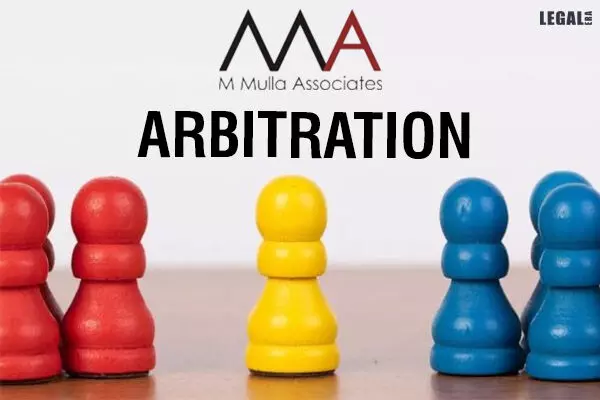- Home
- News
- Articles+
- Aerospace
- Agriculture
- Alternate Dispute Resolution
- Banking and Finance
- Bankruptcy
- Book Review
- Bribery & Corruption
- Commercial Litigation
- Competition Law
- Conference Reports
- Consumer Products
- Contract
- Corporate Governance
- Corporate Law
- Covid-19
- Cryptocurrency
- Cybersecurity
- Data Protection
- Defence
- Digital Economy
- E-commerce
- Employment Law
- Energy and Natural Resources
- Entertainment and Sports Law
- Environmental Law
- FDI
- Food and Beverage
- Health Care
- IBC Diaries
- Insurance Law
- Intellectual Property
- International Law
- Know the Law
- Labour Laws
- Litigation
- Litigation Funding
- Manufacturing
- Mergers & Acquisitions
- NFTs
- Privacy
- Private Equity
- Project Finance
- Real Estate
- Risk and Compliance
- Technology Media and Telecom
- Tributes
- Zoom In
- Take On Board
- In Focus
- Law & Policy and Regulation
- IP & Tech Era
- Viewpoint
- Arbitration & Mediation
- Tax
- Student Corner
- AI
- ESG
- Gaming
- Inclusion & Diversity
- Law Firms
- In-House
- Rankings
- E-Magazine
- Legal Era TV
- Events
- News
- Articles
- Aerospace
- Agriculture
- Alternate Dispute Resolution
- Banking and Finance
- Bankruptcy
- Book Review
- Bribery & Corruption
- Commercial Litigation
- Competition Law
- Conference Reports
- Consumer Products
- Contract
- Corporate Governance
- Corporate Law
- Covid-19
- Cryptocurrency
- Cybersecurity
- Data Protection
- Defence
- Digital Economy
- E-commerce
- Employment Law
- Energy and Natural Resources
- Entertainment and Sports Law
- Environmental Law
- FDI
- Food and Beverage
- Health Care
- IBC Diaries
- Insurance Law
- Intellectual Property
- International Law
- Know the Law
- Labour Laws
- Litigation
- Litigation Funding
- Manufacturing
- Mergers & Acquisitions
- NFTs
- Privacy
- Private Equity
- Project Finance
- Real Estate
- Risk and Compliance
- Technology Media and Telecom
- Tributes
- Zoom In
- Take On Board
- In Focus
- Law & Policy and Regulation
- IP & Tech Era
- Viewpoint
- Arbitration & Mediation
- Tax
- Student Corner
- AI
- ESG
- Gaming
- Inclusion & Diversity
- Law Firms
- In-House
- Rankings
- E-Magazine
- Legal Era TV
- Events
Starting Point for Limitation in Case of Suo Moto Correction of an Award Under Section 34(3) Of The Arbitration and Conciliation Act, 1996

Starting Point for Limitation in Case of Suo Moto Correction of an Award Under Section 34(3) Of The Arbitration and Conciliation Act, 1996
INTRODUCTION:
The Apex Court in a recent decision in M/s USS Alliance vs The State of Uttar Pradesh and Ors1. observed that the starting point for limitation in case of suo moto correction of award would be the date on which the correction was made and the corrected award was received by the party.
FACTS:
An arbitral tribunal in terms of the powers given to it under Section 33(3) of the Arbitration and Conciliation Act, 1996, (“Act”) had on its own initiative made corrections to its own award dated 18th April, 2018, vide an award dated 5th May, 2018.
An application was thereafter filed before the Allahabad High Court by one of the parties to set aside the award on 3rd August, 2018.
The Allahabad High Court, vide its order dated 21st November, 2022, held that the application was filed within the limitation period (“Impugned Order”).
Being aggrieved by the Impugned Order, M/s USS Alliance, the Petitioner, preferred filing a Special Leave Petition before the Apex Court.
ISSUE FOR CONSIDERATION:
The main issue for consideration before the Apex Court was as follows:
When would the starting point for limitation commence in case of an award where corrections have been made by an arbitral tribunal on its own initiative?
JUDGMENT:
The Apex Court observed that the purpose and object of Section 34(3) of the Act, was to enable the parties to study, examine and understand the award and thereafter, if a party chose to or as advised to it, could draft and file its objections within the time specified.
Where corrections have been made to an award, suo moto by an arbitral tribunal, the starting point of limitation to challenge the award would be the date on which the corrections were made by an arbitral tribunal and thereafter the corrected award was received by the parties.
The Apex Court further observed that once an award made by an arbitral tribunal was amended or corrected, it would then be such amended or corrected award which would then be sought to be challenged and not the original award. This is because the original award stood modified.
To substantiate its observations, the Apex Court relied on its earlier decision in M/s Ved Prakash Mithal and Sons vs Union of India2.
The Apex Court further observed that even otherwise, a court had the power to condone a delay for such challenge of award by a further period of thirty days.
In view of its observations set out above, in the present case, the Apex Court held that the application was filed within a period of ninety days from the date of the corrected and modified award and found no reason to interfere with the Impugned Order and dismissed the Special Leave Petition.
2. Special Leave Petition (C) No. 20195 of 2017




